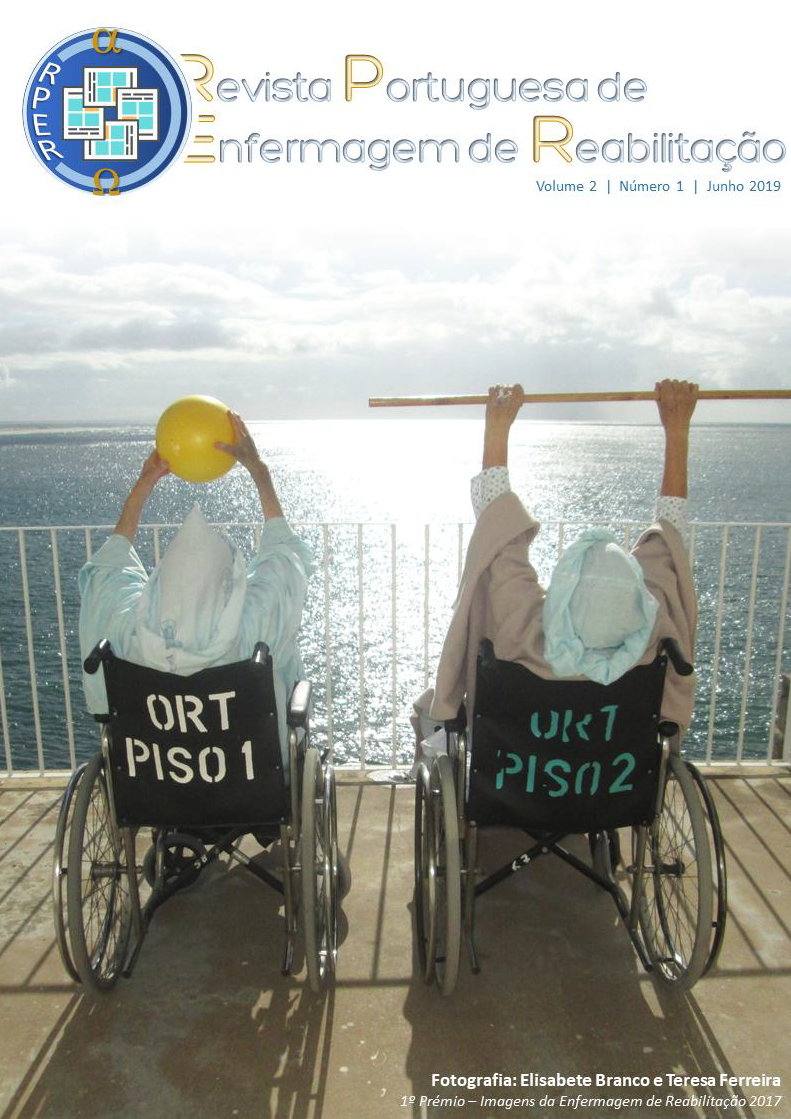Abstract
Background: Depressive disorder is one of the most common forms of mental disorder and one of the greatest causes of health problems nowadays. There has been a need to combine the pharmacological approach with adjuvant treatment such as psychoterapy and physical exercise in the treatment of this disorder.
Objective: To identify the benefits of physical exercise in the person with depressive disorder.
Method: Systematic Review of Literature that was based on the recommendations of the Joanna Briggs Institute on PICO strategy and based on PRISMA, the research question raised was “What are the benefits of physical exercise in people with Depressive Disorder?”. The research was carried out using the electronic database platforms: EBSCOHost and B-on.
Results: A sample of nine studies were included that fulfilled the eligibility and methodological quality criteria, where the type, volume, frequency and duration of the physical exercise practiced in each of the studies were described and analyzed.
Conclusions: The results obtained allow us to conclude that regardless of the frequency, duration and intensity of physical exercise in depressive disorder, this decreases the depressive symptoms, improving also the physical fitness, the cognitive function and the well-being of the person with this disorder.
References
Knapen J, Vancampfort D, Moriën Y, Marchal Y. Exercise therapy improves both mental and physical health in patients with major depression. Disabil Rehabil.. 2015 Jul 31;37(16):1490-5. Acessível em: https://doi.org/10.3109/09638288.2014.972579
Schuch FB, Vancampfort D, Richards J, Rosenbaum S, Ward PB, Stubbs B. Exercise as a treatment for depression: a meta-analysis adjusting for publication bias. J Psychiatr. Res. 2016 Jun 1;77:42-51. Acessível em: https://doi.org/10.1016/j.jpsychires.2016.02.023
Tu RH, Zeng ZY, Zhong GQ, Wu WF, Lu YJ, Bo ZD, He Y, Huang WQ, Yao LM. Effects of exercise training on depression in patients with heart failure: a systematic review and meta?analysis of randomized controlled trials. Eur J Heart Fail.. 2014 Jul;16(7):749-57. Acessível em: https://doi.org/10.1002/ejhf.101
Stubbs B, Vancampfort D, Rosenbaum S, Ward PB, Richards J, Soundy A, Veronese N, Solmi M, Schuch FB. Dropout from exercise randomized controlled trials among people with depression: a meta-analysis and meta regression. J Affect Disord.. 2016 Jan 15;190:457-66. Acessível em: https://doi.org/10.1016/j.jad.2015.10.019
Santa-Clara H, Pinto I, Santos V, Pinto R, Melo X, Almeida JP, Pimenta N, Abreu A, Mendes M. Atividade física e exercício físico: especificidades no doente cardíaco. Rev Factores de Risco. 2015, 35:28-35.
Kerling A, Kück M, Tegtbur U, Grams L, Weber-Spickschen S, Hanke A, Stubbs B, Kahl KG. Exercise increases serum brain-derived neurotrophic factor in patients with major depressive disorder. J Affect Disord.. 2017 Jun 1;215:152-5. Acessível em: https://doi.org/10.1016/j.jad.2017.03.034
Sousa LMM, Firmino CF, Marques-Vieira CMA, Severino S, Pestana HCFC. Revisões da literatura científica: tipos, métodos e aplicações em enfermagem. Rev Port Enferm Reabil. 2018; 1(1): 46-55. Acessível em: http://www.aper.pt/ficheiros/revista/rpern0.pdf.
The Joanna Briggs Institute (AT). Joanna Briggs Institute’s user manual: version 5.0 system for the unified management. Assessment and Review of Information. Adelaide: Joanna Briggs Institute; 2011 Acessível em: http://joannabriggs.org/assets/docs/sumari/SUMARI-V5-User-guide.pdf
Sousa LM, Marques JM, Firmino CF, Frade F, Valentim OS, Antunes AV. Modelos de formulação da questão de investigação na Prática Baseada na Evidência. Rev Inv. Enferm. 2018; S2(23): 31-39. Acessível em: http://hdl.handle.net/20.500.12253/1287
Sousa, LMM, Vieira, CMA, Severino, SS, Antunes, AV. A metodologia de Revisão Integrativa da Literatura em Enfermagem. Rev Inv. Enferm. 2017; S2(21): 17-26. Acessível em: http://hdl.handle.net/20.500.12253/1311
Registered Nurses’ Association of Ontario (CA). Falls Prevention: Building the Foundations for Patient Safety. A Self Learning Package. Toronto, Canada: Registered Nurses’ Association of Ontario; 2007. Acessível em: https://rnao.ca/bpg/guidelines/resources/falls-prevention-building-foundations-patient-safety-selflearning-package
Moher D, Liberati A, Tetzlaff J, Altman DG, The PRISMA Group. Preferred Reporting Items for Systematic Reviews and Meta-Analyses: The PRISMA Statement.PLoS Med. 2009; 6(7): e1000097. Acessível em: https://doi.org/10.1371/journal.pmed1000097.
Minghetti A, Faude O, Hanssen H, Zahner L, Gerber M, Donath L. Sprint interval training (SIT) substantially reduces depressive symptoms in major depressive disorder (MDD): A randomized controlled trial. Psychiatry Res. 2018 Jul 1; 265:292-7. Acessível em: https://doi.org/10.1016/j.psychres.2018.04.053
Kerling A, Hartung D, Stubbs B, Kück M, Tegtbur U, Grams L, Weber-Spickschen TS, Kahl KG. Impact of aerobic exercise on muscle mass in patients with major depressive disorder: a randomized controlled trial. Neuropsychiatr Dis Treat.. 2018; 14:1969. Acessível em: https://doi.org/ 10.2147/NDT.S167786
Kerling A, Tegtbur U, Gützlaff E, Kück M, Borchert L, Ates Z, Frieling H, Hüper K, Hartung D, Schweiger U, Kahl KG. Effects of adjunctive exercise on physiological and psychological parameters in depression: a randomized pilot trial. J Affect Disord. 2015 May; 177:1-6. Acessível em: https://doi.org/10.1016/j.jad.2015.01.006
Olson RL, Brush CJ, Ehmann PJ, Alderman BL. A randomized trial of aerobic exercise on cognitive control in major depression. Clin Neurophysiol. 2017 Jun;128(6):903. Acessível em: https://doi.org/ 10.1016/j.clinph.2017.01.023
Haller N, Lorenz S, Pfirrmann D, Koch C, Lieb K, Dettweiler U, Simon P, Jung P. Individualized Web-Based Exercise for the Treatment of Depression: Randomized Controlled Trial. JMIR mental health. 2018;5(4):e10698. Acessível em: https://doi.org/ 10.2196/10698
Carneiro LS, Fonseca AM, Vieira-Coelho MA, Mota MP, Vasconcelos-Raposo J. Effects of structured exercise and pharmacotherapy vs. pharmacotherapy for adults with depressive symptoms: a randomized clinical trial. J Psychiatr Res. 2015 Dec 1;71:48-55. Acessível em: https://doi.org/ 10.1016/j.jpsychires.2015.09.007
Pentecost C, Farrand P, Greaves CJ, Taylor RS, Warren FC, Hillsdon M, Green C, Welsman JR, Rayson K, Evans PH, Taylor AH. Combining behavioural activation with physical activity promotion for adults with depression: findings of a parallel-group pilot randomised controlled trial (BAcPAc). Trials. 2015 Dec 1;16(1):367. Acessível em: https://doi.org/ 10.1186/s13063-015-0881-0
Ólafsdóttir KB, Kristjánsdóttir H, Saavedra JM. Effects of exercise on depression and anxiety. A comparison to transdiagnostic cognitive behavioral therapy. Community Ment Health J. 2018 Aug 1;54(6):855-9. Acessível em: https://doi.org/ 10.1007/s10597-017-0213-9
Helgadóttir B, Hallgren M, Ekblom Ö, Forsell Y. Training fast or slow? Exercise for depression: a randomized controlled trial. Prev Med. 2016 Oct 1; 91:123-31. Acessível em: https://doi.org/10.1016/j.ypmed.2016.08.011

This work is licensed under a Creative Commons Attribution-NonCommercial-NoDerivatives 4.0 International License.
Copyright (c) 2019 Revista Portuguesa de Enfermagem de Reabilitação
Downloads
| Abstract Views | 1415 |
|---|
| PDF (Português (Portugal)) | 1488 |
|---|
| 86 |
|---|





